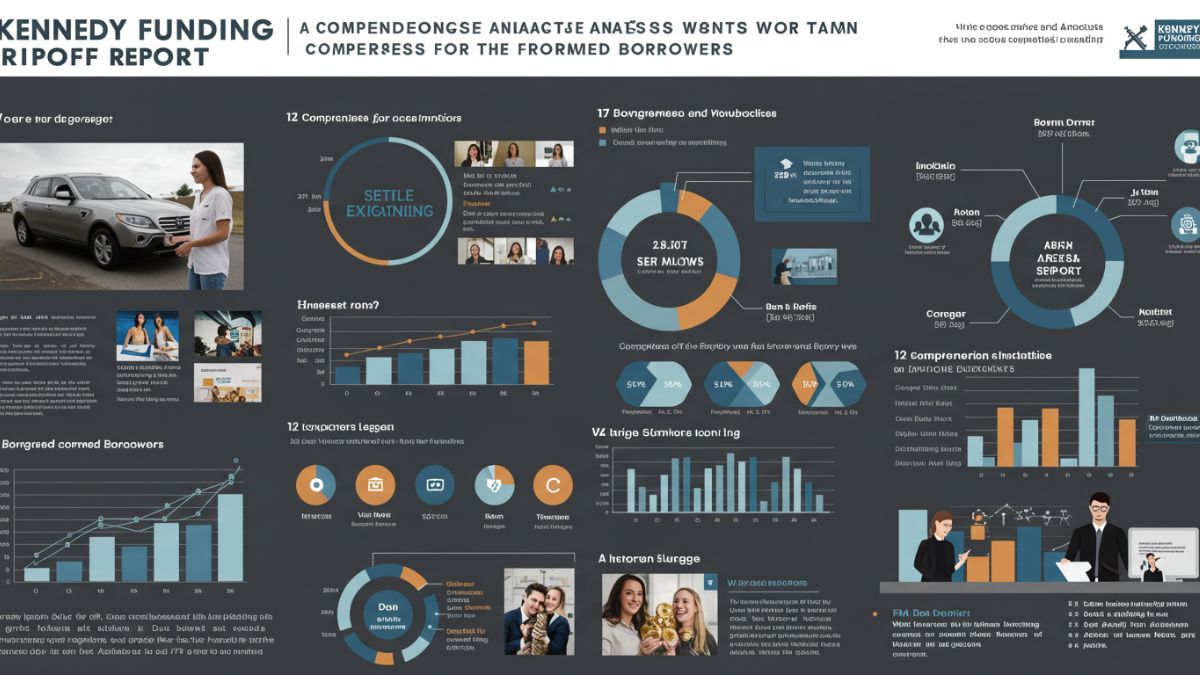When researching hard money lenders, you’ve likely come across the phrase “Kennedy Funding Ripoff Report.” This term encapsulates a variety of online complaints, accusations, and dissatisfied customer stories aimed at Kennedy Funding, a long-established commercial real estate lender. In this article, we’ll dissect the Kennedy Funding Ripoff Reports, separating anecdotal gripes from verifiable concerns, so that you can approach your borrowing decision with clarity and confidence.
Origins of the Kennedy Funding Ripoff Report
What Sparked the “Kennedy Funding Ripoff Reports”?
The Kennedy Funding Ripoff Report first emerged on consumer feedback sites and real estate forums roughly a decade ago. Borrowers who were frustrated by unexpected costs, lengthy approval processes, or tough qualification requirements began sharing their stories under this umbrella label. Over time, the phrase became shorthand for any negative account of experiences with Kennedy Funding’s loan products.
Key Platforms Hosting the Kennedy Funding Ripoff Reports
-
Ripoff Report Website: A general complaint site where individuals post unverified claims about businesses.
-
Real Estate Investor Forums: Threads where small-scale investors discuss their funding challenges and sometimes vent about perceived predatory practices.
-
Social Media Groups: Facebook and LinkedIn groups centered on property investing, where unhappy borrowers occasionally sensationalize their issues.
Common Allegations Documented in the Kennedy Funding Ripoff Report
High Interest Rates and Fees
One of the most prevalent criticisms in the Kennedy Funding Ripoff Reports revolves around interest rates that can exceed 12% annually, coupled with origination fees ranging from 2% to 3% of the loan amount. While hard money loans traditionally carry higher rates than conventional mortgages, some borrowers feel blindsided when these costs escalate unexpectedly due to loan extensions or late-payment penalties.
Perceived Lack of Transparency
Another frequent entry in the Kennedy Funding Ripoff Reports concerns an opaque fee structure. Complainants claim that certain closing costs—like appraisal fees or administrative charges—were not fully disclosed during initial discussions. In cases where project timelines stretch beyond the original term, additional fees accrue, creating a larger final bill than some borrowers anticipated.
Customer Service Frustrations
Several posts under the Kennedy Funding Ripoff Report banner recount challenges in securing timely responses from account managers. Delays in disbursement, slow answers to underwriting inquiries, and limited weekend availability have all been cited as factors that escalated stress levels for time-sensitive projects.
Evaluating the Credibility of the Kennedy Funding Ripoff Reports
Separating Isolated Incidents from Systemic Issues
While individual complaints can be legitimate, it’s vital to examine whether patterns exist or if certain stories are outliers. An isolated misunderstanding over a late fee, for example, doesn’t necessarily reflect a company-wide policy of hidden costs. Conversely, if dozens of borrowers report the same fee confusion, that signals a transparency problem worth noting.
Verifying Details Against Official Disclosures
-
Rate Sheets & Term Sheets: Always compare the figures in your term sheet with those posted on Kennedy Funding’s official site.
-
Customer Service SLAs: Review the lender’s stated communication turnaround times and confirm if your account manager adheres to these standards.
-
Third-Party Reviews: Consult impartial sources like the Better Business Bureau or industry watchdogs to see if formal complaints have been filed.
Positive Perspectives on Kennedy Funding
Track Record and Industry Expertise
Kennedy Funding has financed more than $2 billion in commercial real estate deals since its founding in 1987. Their specialization in hard money and bridge loans has allowed projects to proceed when traditional bank underwriting would stall, making them a go‑to for seasoned investors who prioritize speed over the lowest possible rate.
Tailored Solutions for Complex Deals
Unlike standardized bank products, Kennedy Funding often crafts custom loan structures for unique scenarios—such as mixed‑use developments or properties with existing tenants. This flexibility has earned praise in customer reviews that contrast sharply with the negative reports grouped under the “Kennedy Funding Ripoff Reports.”
Tips for Prospective Borrowers in Light of the Kennedy Funding Ripoff Report
1. Scrutinize Every Line of Your Loan Agreement
Ensure that your copy of the loan agreement spells out interest calculations, fee triggers, and extension provisions. If any clause reads ambiguously, request clarification in writing before you sign.
2. Compare Multiple Lenders
To gauge whether Kennedy Funding’s terms are competitive, obtain quotes from at least two other hard money lenders. Compare not only the headline interest rate but also origination fees, prepayment penalties, and appraisal costs.
3. Ask for References
Request contact information for recent Kennedy Funding clients who financed projects similar to yours. A brief conversation with a current borrower can reveal firsthand how transparent and responsive the team has been.
4. Monitor Key Dates Closely
Late fees can accumulate quickly if you miss a payment or fail to request an on‑time extension. Set calendar reminders at least a week before each due date to verify payment instructions and avoid surprise penalties.
Conclusion: Making an Informed Judgment Beyond the “Kennedy Funding Ripoff Reports”
The Kennedy Funding Ripoff Report reflects genuine grievances alongside anecdotal misunderstandings. By studying the allegations—high rates, fee disclosures, and customer service—and contrasting them with Kennedy Funding’s long-standing role in commercial real estate lending, borrowers can discern fact from hype. Thorough due diligence—reviewing documents, comparing alternatives, and tapping into peer experiences—remains the best safeguard against any financing pitfalls. Armed with balanced insight, you’ll be well-equipped to determine whether Kennedy Funding’s hard money solutions align with your project needs and risk tolerance.











